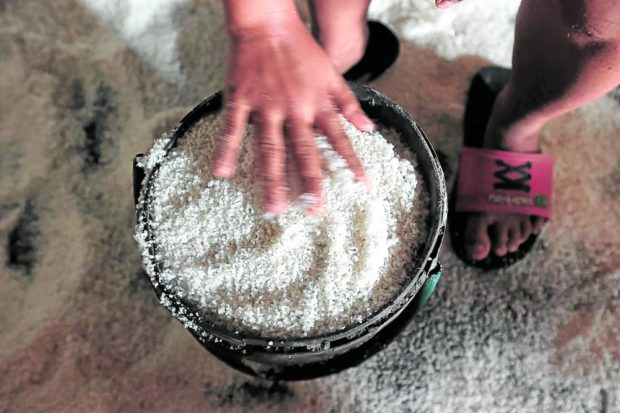
LOCAL HARVEST Salt is still harvested in small farms in the coastal town of Noveleta in Cavite province. The country has 36,000 kilometers of shoreline but only a few provinces are left producing salt. —GRIG C. MONTEGRANDE
MANILA, Philippines —The House Agriculture and Food Committee has deferred voting on a salt industry revitalization bill to form a technical working group (TWG) instead to solicit more feedback on the proposed substitute legislation.
During the hearing on Tuesday, committee chair and Quezon 1st District Rep. Mark Enverga admitted that further discussions are needed before the panel approves House Bill No. 1976, authored by Kabayan Rep. Ron Salo.
While several stakeholders provided their position on Salo’s bill, no representatives from the Department of Agriculture (DA) and the Department of Finance (DOF) were present to give their inputs, prompting Enverga to emphasize the need to involve the two agencies in crafting the measure.
“The bill seeking to revitalize the salt industry, of course, needs further discussions, and best in a technical working group for us to be able to come up with a substitute bill that would incorporate all the position and comments of all concerned stakeholders,” Enverga said.
“We will await, of course, the referral to the committee of House Bill No. 5676 authored by the Honorable Wilbert Lee, again we would want […] may I please request that DA should play, should be present in the technical working group, maraming questions kasi na dapat sila rin makaka-sagot. DOF, and DENR, for their comments,” he added.
Rep. France Castro of the Alliance of Concerned Teachers (ACT) tried to find out how much salt the country imports during interpellation. Due to the absence of DA and DOF participants, Enverga asked Gerard Khonghun, a private sector stakeholder.
“Unfortunately wala tayong representative from DOF or DA, or from Customs ngayon. Although it has been said, sabi it’s 93 percent ang iniimport natin na asin. Pero baka Mr. Gerard Khonghun, you may be knowledgeable with the current status of importation?” Enverga asked.
The Philippines imports at least 550,000 tons of salt annually, says Khonghun, head of the Philippine Association of Salt Industry Networks (PhilASIN), and in bad production years, notably during La Niña, this number might hit 600,000 tons.
Earlier in the hearing, Khonghun warned lawmakers that the country may import 96 percent of its salt needs by 2030 if the trend is not reversed or if Salo’s bill is not enacted.
To increase national salt production, House Bill No. 1976 would establish a department to spearhead projects like the mapping out of new areas appropriate for salt farming, the provision of necessary machinery and infrastructure, and other similar endeavors.
Enverga assured the lawmakers and the public that his committee would prioritize Salo’s measure, saying that they would try to calendar the meetings of the TWG so that concerns of other sectors can be addressed.
“Rest assured that this will be a priority of the committee so we hope when we resume, Cong. Ron, Cong. Wilbert, baka we could calendar already the technical working group hearing so that we could make a consolidated version of the proposed measure, na addressing already the concerns by the stakeholders and the members of this committee,” the committee chair said.
For a long time, DA has been criticized for having to import salt despite the fact that many people believe the country could be a global leader in the salt industry.
In August of last year, Senate Majority Floor Leader Joel Villanueva said it was embarrassing for the country to import salt when it has more than 36,000 kilometers of shoreline.
READ: ‘Shameful’ for archipelagic PH to import salt, says Villanueva
In response, the Department of Agriculture assured the public that it was making every effort to increase salt output.
READ: Department of Agriculture pushes boost to salt making
READ: Salt industry revival plan to start with ‘profiling’ – DA